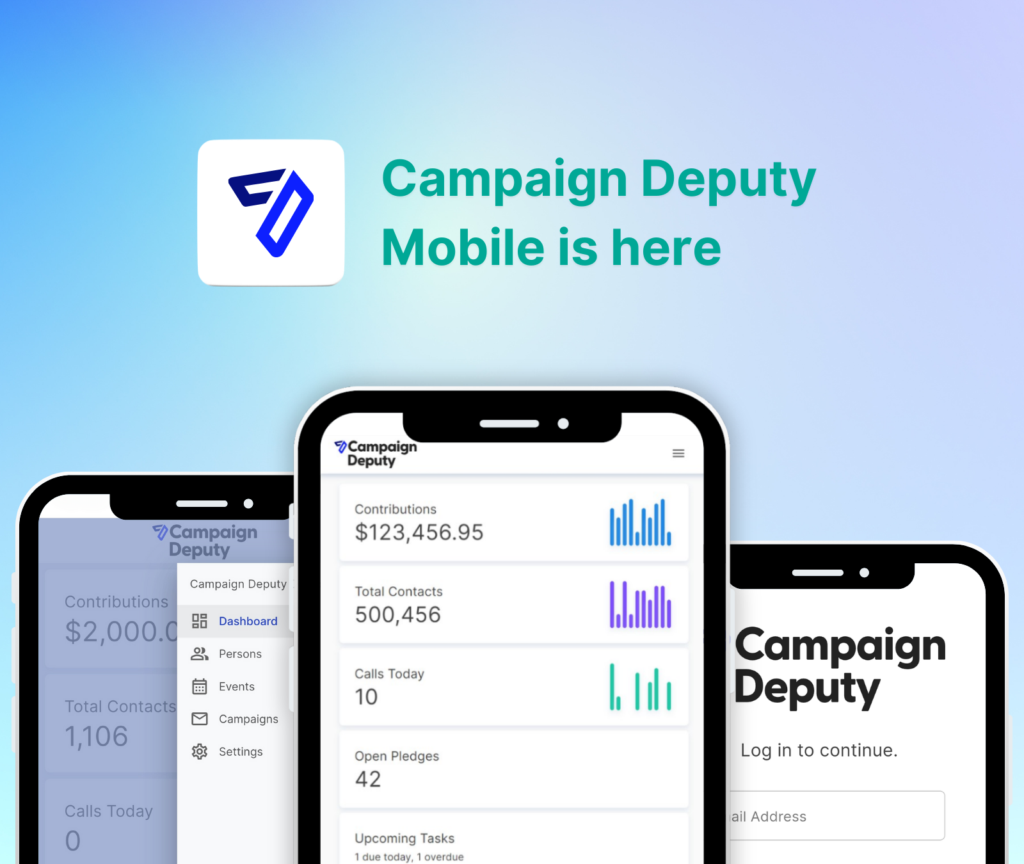Running for Mayor is a great way to get involved in your local government and improve your community, or as a first step into building a career in politics if you’re passionate about change.
There’s a lot that goes into a Mayoral campaign and navigating the bureaucracy can be daunting.
If you want to learn how to run for Mayor of your town or city, this guide should hopefully make your life a little easier.
Before we get into it, every Mayoral campaign needs fundraising, so check out how Campaign Deputy can get you started, today!
How To Run For Mayor Of Your Town Or City
We’re going to look at the 3 most important aspects of running for Mayor:
Every town or city has slightly different processes to run for office, so the first thing you should do is research your local city government.
The best places to do this are on your city or state’s websites, your state’s election board website, or your Secretary of State’s website.
Here’s a great directory with links to all local government websites and resources.
These websites are going to be your best initial sources of information, but you should also try to network with elected officials already in local politics for advice on understanding the intricacies of running for local office.
Checking in with your local Democratic Party is a great first step to gaining resources an networking!
1. How The Mayor Is Elected And Who Appoints Them
Like the President, Mayors are elected into office by the people who live in the area and are legally allowed to vote in local government elections.
There are two types of Mayor-council systems:
- Weak-Mayor Government: The Mayor has no formal authority outside the council. They are more of a figurehead position with no real powers to appoint staff or veto council votes.
- Strong-Mayor Government: The Mayor has almost complete administration authority. They have the power to appoint staff, prepare and administer the city budget, has veto power over council votes, and has a lot of political independence.
The type of Mayoral system you participate in will depend on the local office you’re looking to run for. The best type of government for a city depends on the city’s size, population, and needs.
What Does A Mayor Do?
The local Mayor-Council system dictates the duties responsibilities of the Mayor.
In general, Mayors may be responsible for:
- Serving on the city council
- Voting in council meetings
- Appointing council members and citizens to advisory boards or commissions
- Receiving, preparing, and reporting on the annual budgets
Here you can research a more in-depth review of Mayoral duties and responsibilities specific to your state.
2. Requirements To Run For Mayor
Each town or city will have its own unique requirements to run for Mayor.
However, most towns and cities will have a version of the following criteria:
- Age restriction – You must be at least 18 years or older to run for Mayor in most local government elections. However, this can vary widely from 30+ years to no requirement at all.
- Residential status – You might be required to be living in the area for a certain amount of time before running for Mayor, usually a year or more.
- Voting status – Some cities might require you to be a registered voter before you can run for office.
Fortunately, the requirements to run for Mayor in most cases aren’t excessive.
Be sure to check your local government’s election code for requirements before you start your campaign.
How Much Does It Cost To Run For Mayor?
Costs to run for Mayor will largely vary depending on the size and average income of the community you’re campaigning in.
For example, campaigning in New York City will cost you significantly more than running in a small rural town.
Typical fundraising for Mayoral races varies widely. In Lexington, KY, candidates average less than $100,000, whereas in some megacities it can be as high as $100 million or more. Check finance disclosures for your local race to see what the typical fundraising is each year.
Additionally, be sure to brush up on electoral fundraising laws to avoid legal issues by understanding exactly how and when campaign funds can be spent.
3. Steps To Help You Win The Mayoral Election
Before you can start your campaign for Mayor, there’s a list of important details you’ll need to address.
From fundraising to recruiting staffers, there’s a lot you’ll need to oversee while setting up your political campaign.
Here are 5 important steps you’ll need to take to succeed in your Mayoral campaign:
1. Filing for Candidacy
Before you start your campaign, you’ll need to let your council know that you intend to run for Mayor.
You do this by completing specific forms and providing the necessary documentation provided by your local government office.
As with everything, the documentation and forms involved differ from city to city – so be sure to research this for your specific local election.
2. Fundraising Campaign
Unless you’re wealthy and plan to fund your own Mayoral campaign, then you’ll need to get used to the idea of fundraising.
The more money your raise, the more you can publicly promote your campaign to interest voters.
You can also recruit more staff to help you scale your campaign for greater exposure, and along with that – more votes!
There are a number of ways to raise money, such as holding fundraising events, soliciting donations from individuals and businesses, and even applying for grants.
Effective fundraising strategies are often what set winners apart from losers in political campaigns.
3. Campaign and Personal Branding
One way to establish yourself in local elections is with unique branding.
Gaining public awareness is key, and being memorable is as important as the policies you’re championing.
A great way to do this is through active community volunteering, which can boost fundraising efforts be increasing your name recognition.
Your success depends on people remembering your name just as much as your campaign branding like your logo, slogans, policies, and any touchpoint you have with them.
By maintaining brand consistency and using confidence-building messaging, you can effectively connect with the voting public and win their favor.
4. Campaign Staff
No political campaign is complete without campaign staff.
These people support your campaign by organizing public events, managing campaign finances, canvassing and data entry, and pretty much any support you need to succeed.
This team should primarily include people with skills in fundraising, marketing, and organizing.
In most cases, to run an effective Mayoral campaign, you’ll need to fill a minimum of 4-7 roles:
- Campaign Manager: The campaign manager is responsible for the overall planning and execution of the campaign. They will work with you to develop a campaign strategy, hire and mange staff, raise money, and get your message out to voters.
- Finance Director/Treasurer: The finance director is responsible for managing the campaign’s finances. They will develop a budget, track spending, raise money, and file financial reports.
- Organizer/Field Director: The organizer is responsible for building and mobilizing the campaign’s base of support. They will recruit volunteers, organize canvassing and phone banking efforts, and help get voters to the polls.
- Communications Director: The communications director is responsible for crafting and delivering the campaign’s message. They will write press releases, manage social media, and work with the media to get your message out.
In addition to these roles, you may also need to expand or solidify additional roles, such as a policy advisor, a scheduler, or a graphic designer.
However, be mindful, the more staff you recruit (unless they’re volunteers), the more it’ll impact the cost of your campaign.
The specific staff you may need will depend on the size and scope of your campaign. Some small races may involve as few as 2 staffers or less, whereas larger races may essentiate 6-7+ staffers to ensure a fighting chance (though don’t let that scare you).
It is important to start building your campaign team early. This will give you time to find the right people for the job and to get them up to speed on your campaign.
You should also make sure that your team is diverse, with people from different backgrounds and perspectives. This will help you reach a wider range of voters and build a stronger campaign.
5. Endorsements
An important skill you’ll need to develop as you run for Mayor is networking.
Your goal is to generate as much support from well-known public figures as possible, including celebrities, athletes, company stakeholders, and other politicians.
Endorsements are valuable social proof that serve to increase public confidence in your campaign.
Getting the right endorsements could win you favor with huge portions of your community. So get used to speaking to people from all walks of life and getting to know your community better than most, which is great if you want to be a good Mayor.
The more endorsements you can attract from different sectors of your community, the wider you’re able to cast your Mayoral campaign to capture the attention of voters.
An effective method of gaining endorsements is through Call Time.
Call Time is a practical way to boost fundraising for your campaign. By contacting friends, family, and other potential donors, candidates like you can build relationships and solidify their credibility.
Many candidates streamline this process through Call Time management software such as Campaign Deputy.
Check out our article here for helpful tips for effective Call Time Management Tips.
Voter Engagement
There are 2 primary ways to connect with local constituents:
- Media – For Mayoral elections, you’ll use media like radio ads, print ads, social media posts, email blasts, and even websites. Media messaging is a great way to reach a large number of voters and to introduce your campaign to them. It can also help to shape the public’s perception of you and your campaign.
- Canvassing – Going door-to-door is still one of the most effective, though more traditional, methods for engaging with voters. You can speak with them face-to-face to understand their biggest concerns and get their thoughts on the future of your town or city, to help steer your policies and to ultimately serve your community better. A more modern approach to canvassing may include methods such as phone banking and texting constituents to maintain engagement and gain insights.
This combination of media messaging and canvassing provides voter engagement at various levels, benefitting your campaign in different ways.
If you are running for Mayor, it’s important to have a strong campaign strategy that includes both media messaging and canvassing.
This will help you to reach a wide range of voters, build relationships with them, and increase voter turnout.
In Summary
Here’s how to run for Mayor in your town or city:
- Research your local government requirements and get to know other local politicians
- File for candidacy and recruit your campaign support staff
- Design your campaign media and establish your public messaging
- Start your fundraising campaign and network with public figures to attract endorsements
- Engage with voters on various levels to gain attention and win votes
Now that you know how to run for Mayor, it’s time to find a comfy seat and start making some calls!
We wish you the best of luck with your campaign! Get in touch with the experts here at Campaign Deputy if you need any help with your fundraising. We’re always happy to support!






